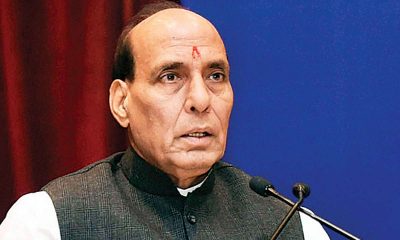World
Pope to announce changes for divorced Catholics

Vatican City: Pope Francis is expected to announce revisions to the process by which Catholics may annul their marriages, a media report said on Tuesday.
A statement from the Vatican does not detail the proposed reforms, but Francis has said that obtaining annulments can be too cumbersome and costly, dragging on for years and can be quite expensive, as per reported.
The Catholic Church does not recognise civil divorces. Instead, its theology holds that marital unions sanctified by God are indissoluble.
Annulments, available only through church tribunals, state that the marriage contract was fundamentally flawed from the start, and hence invalid in the eyes of the church. In the 1980s, the church added another step to the process, requiring a second review before an annulment can be granted.
Without an annulment, a divorced Catholic who remarries is considered an adulterer and may not participate in some sacraments, including Holy Communion.
Led by Pope Francis, the church is holding high-level meetings, called synods, to debate that teaching. The next synod is to be held in October.
The announcement is expected to be yet another step in Pope Francis’ efforts to reform the church.
Last week, he announced that during an upcoming “Year of Mercy,” Catholic priests around the world will be able to forgive the “sin” of abortion. Under canon law, absolution of certain serious sins, including abortion, is usually reserved only to bishops.
Pope Francis says all priests can forgive women who have had abortions
World
Lockdowns in China Force Urban Communities to Defy Censorship and Vent Frustration Online

Shanghai’s rich middle class is leading a wave of online dissent over the strict and prolonged lockdowns imposed in various parts of the country. Chinese internet censorship is struggling as patience is wearing thin in many urban centers, coming up with creative forms of online protests.
Social Media Posts Revealing Lockdown Tension in Shanghai
Drawn-out lockdowns are nothing new in China as authorities insist with the nation’s zero-Covid policy since the start of the pandemic. Currently over This time around, however, metropolitan areas like Shanghai are increasingly difficult to keep quiet, given that its more than 25 million residents have seen weeks of total isolation along with food shortages and many other service interruptions.
Dozens of towns and reportedly over 300 million Chinese citizens have been affected by lockdowns of different severity. As expected, urban netizens have been most outspoken over their difficulties by finding creative ways to get around state censorship and bans placed on topics, news comments and spontaneous campaigns.
Shanghai residents have been using mobile proxies and hijacking seemingly unrelated hashtags to talk about healthcare issues, delivery failures and the overall severity of their situation. The “positive energy” that the Chinese government wants to transmit during the recent prolonged series of lockdowns does not come naturally to those counting food supplies and online censors are working hard to filter words, trending topics and undesired social media sharing.
WeChat groups and message threads are under constant monitoring. Posts questioning the zero-Covid approach have been quickly deleted, including by leading Chinese health experts like Dr. Zhong Nanshan. Video footage is soon censored and protests and investigations are quickly made to disappear.
Where this has not worked, officials have exposed banners with warnings and outright threats like “watch your own mouth or face punishment”, while drones have been patrolling the city skies. Yet, if anything, this has led to further tensions and unspoken confrontation with Shanghai’s educated and affluent middle class.
Creative Online Solutions Harnessing Civic Energy
Announcements by Chinese social media that they would be publishing the IP addresses of users who “spread rumors” have not helped either. Tech industry research has shown that much of Asia’s tech-savvy population has a habit of using mobile proxies and other privacy tools, quickly finding workarounds to browse the internet freely and talk to the world about the hottest topics.
The sheer volume of forbidden posts is already a challenge for the very censorship system, experts explain. Unable to track all trending hashtags, state workers overlook topics that speak about the US, Ukraine or other popular news. Linking human rights elsewhere to their situation, Chinese online dissidents establish their informal channels and “hijack” the conversation to share personal or publicly relevant information about the Covid suppression in their town.
Sarcastic and satirical posts still dominate. Others hope to evade the censors by replacing words from famous poems or the national anthem. One thing is certain – social media, when harnessed with the right creativity, has proven its ability to mount pressure on the government in even some of the most strictly controlled tech environments like China.



















